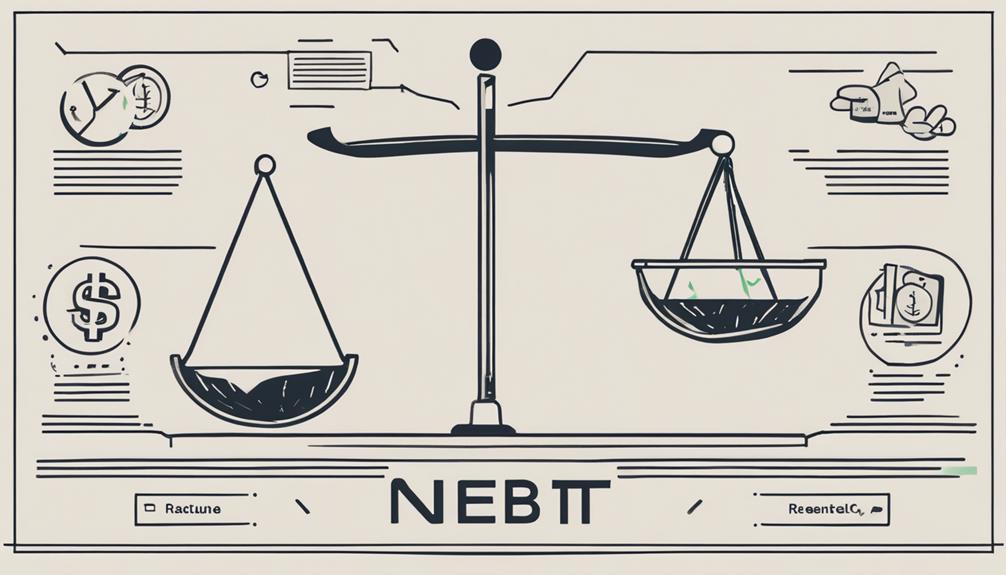The intricate web of financial management within a country involves a delicate balance of numerous factors that impact economic stability and growth. From crafting national budgets to implementing fiscal policies and carefully managing revenues and expenditures, the mechanisms in place are designed to navigate through a complex terrain of economic challenges. However, the question persists: how do countries truly manage their money amidst global uncertainties, changing market dynamics, and evolving financial landscapes? The answer lies in a multifaceted approach that requires astute decision-making, foresight, and adaptability to ensure sustainable financial well-being.
Key Takeaways
- National budgets strategically allocate resources for development and stability.
- Fiscal policies influence economic landscape through taxation, spending, and borrowing decisions.
- Budget allocation strategies prioritize essential sectors like healthcare and education.
- Debt management strategies and trade balancing are crucial for financial stability and growth.
Importance of National Budgets

National budgets serve as fundamental tools for governments to strategically allocate financial resources towards key sectors essential for national development and stability. Within the framework of national budgets, Central Banks play a critical role in overseeing monetary policy and influencing economic performance. Central Banks, such as the Federal Reserve in the United States or the European Central Bank, work closely with governments to ensure financial stability, control inflation, and promote economic growth. Through mechanisms like setting interest rates, regulating the money supply, and supervising financial institutions, Central Banks aim to maintain a balanced and stable economic environment conducive to sustainable development.
In the realm of national budgets, Central Banks collaborate with governments to align fiscal and monetary policies, ensuring coherence in managing the country's finances. This coordination is essential for optimizing resource allocation, managing public debt, and fostering investor confidence. By working hand in hand, governments and Central Banks can navigate economic challenges, mitigate risks, and enhance the overall effectiveness of national budgeting strategies.
Role of Fiscal Policies
Within the realm of economic management, governments employ fiscal policies through decisions on taxation, spending, and borrowing to influence the overall economic landscape and achieve specific goals. Countries utilize fiscal policies to address various economic objectives such as controlling inflation, promoting growth, and reducing unemployment. These policies can be categorized as either expansionary, aiming to stimulate the economy, or contractionary, focusing on reducing inflationary pressures.
| Fiscal Policies | Description |
|---|---|
| Expansionary | Aim to boost economic activity and demand |
| Contractionary | Focus on curbing inflationary pressures |
| Economic Goals | Control inflation, promote growth, reduce unemployment |
| Coordination | Essential between monetary and fiscal authorities for effective economic management |
Governments adjust their fiscal strategies based on prevailing economic conditions, such as increasing spending during recessions to bolster demand. It is crucial to note that the coordination of fiscal policies with monetary policy is vital for ensuring a balanced and comprehensive approach to economic management.
Managing Government Revenues

Optimizing government revenue through strategic asset management is a key component of effective fiscal governance. Countries aim to increase annual revenue by about 3% by managing their assets efficiently. This approach helps reduce risks and allocate funds to critical areas such as education and healthcare, enhancing societal well-being. Understanding the composition of government assets, which includes infrastructure, financial investments, and natural resources, is crucial for revenue optimization. Unfortunately, many governments lack a clear understanding of their assets, limiting their ability to utilize public wealth for the public's benefit effectively.
In times of financial crisis, managing government revenues becomes even more pressing. Addressing liabilities and debt management are essential aspects of revenue management to ensure sustainable fiscal health during economic downturns. Effective management of government revenues can aid in navigating through turbulent times, maintaining stability, and supporting the economy's recovery. By prioritizing strategic asset management and optimizing revenue streams, countries can enhance their financial resilience and better address the challenges posed by financial crises.
Controlling Public Expenditures
Governments employ budget allocation strategies to set spending limits and prioritize funds for essential sectors like healthcare and education. Implementing robust expense monitoring systems allows for real-time tracking of expenditures and ensures adherence to budgetary constraints. Fiscal responsibility measures, such as cost-cutting initiatives and performance evaluations, are essential tools in maintaining effective control over public spending.
Budget Allocation Strategies
Strategically allocating budgets is a fundamental practice in managing country finances to control public expenditures effectively. Budget allocation strategies play a crucial role in helping governments prioritize spending on key sectors such as healthcare, education, and infrastructure. By analyzing spending patterns, governments can adjust budget allocations to align with national priorities and long-term financial goals. This financial planning ensures optimal resource utilization for economic development and social welfare programs. Transparent budgeting processes and accountability mechanisms are essential to promote efficient management of public finances and reduce wasteful expenditures. Overall, strategic budget allocation is a cornerstone of sound financial management, enabling governments to meet the needs of their citizens while ensuring fiscal responsibility and sustainability.
Expense Monitoring Systems
Implementing robust expense monitoring systems is essential for countries to effectively control public expenditures and ensure financial transparency and accountability. These systems help track and analyze government spending patterns, enabling the identification of areas of overspending or inefficiency. By implementing expense monitoring systems, countries can ensure transparency and accountability in managing public funds. Monitoring expenses allows for better budget planning and allocation of resources to critical areas like healthcare, education, and infrastructure. Additionally, effective expense monitoring systems contribute to fiscal discipline and prudent financial management practices in countries worldwide.
- Expense monitoring systems track and analyze government spending patterns.
- Identify areas of overspending or inefficiency.
- Ensure transparency and accountability in managing public funds.
- Contribute to fiscal discipline and prudent financial management practices.
Fiscal Responsibility Measures
How can countries exercise fiscal responsibility through effective control of public expenditures to ensure sustainable financial health? One crucial aspect is managing the flow of credit within the economy. By controlling public expenditures, nations can avoid budget deficits and excessive debt accumulation. This helps in maintaining economic stability and promoting growth. Monitoring and regulating government spending play a vital role in preventing wasteful expenses and upholding fiscal discipline. Fiscal responsibility measures include transparent budget processes and enforcing accountability in public financial management. Efficient allocation of resources, especially towards essential sectors like healthcare and education, is achievable through prudent control of public expenditures. Ultimately, these measures contribute to the overall economic well-being of a country by ensuring financial sustainability and prudent resource management.
Impact of Economic Policies
Economic policies play a crucial role in shaping a country's financial landscape. The decisions made regarding monetary and fiscal policies have direct impacts on various aspects of the economy, from controlling inflation to influencing investment levels. Additionally, the effectiveness of economic regulations can determine the overall stability and growth potential of a nation's financial system.
Monetary Policy Effects
Monetary policy's impact on economic conditions is significant, as it plays a crucial role in managing fluctuations and achieving stability in prices. Understanding the effects of monetary policy is essential for grasping how countries manage their finances. Here are four key points to consider:
- Adjusting Money Supply: Central banks regulate economic activity by altering the money supply through the buying or selling of securities.
- Influencing Interest Rates: Open market operations are used to impact interest rates, which, in turn, affect borrowing, spending, and investment decisions.
- Stimulating Economic Growth: Lowering interest rates encourages borrowing and spending, thereby boosting economic growth.
- Controlling Inflation: Conversely, raising interest rates helps control inflation by curbing excessive borrowing and spending.
Fiscal Policy Decisions
The implementation of fiscal policy decisions plays a pivotal role in shaping a country's economic landscape and influencing its overall financial stability. Countries spend through fiscal policy tools like taxation and government expenditure, impacting aggregate demand and economic growth. During economic downturns, governments adjust fiscal policies by increasing spending or cutting taxes to boost demand and stabilize the economy. Effective fiscal policies not only address income inequality but also promote long-term growth and ensure sustainable public finances. Balancing fiscal policy decisions is crucial for achieving macroeconomic stability, avoiding excessive debt, and supporting social welfare programs. The interactions between fiscal policy, monetary policy, and other economic factors significantly shape a country's overall economic performance and policy effectiveness.
Economic Regulation Impacts
Impacts of economic regulation are fundamental in shaping a country's financial management strategies and overall economic performance.
- Monetary Policy Tools: Central banks use interest rate adjustments to influence borrowing costs, impacting consumer spending and investment decisions.
- Fiscal Policy Measures: Government spending choices directly affect economic stability and growth potential, influencing employment rates and inflation levels.
- Exchange Rate Policies: Economic regulations leading to currency fluctuations impact trade balances, affecting exports and imports, as well as foreign investments.
- Financial Stability: Effective economic regulation is essential for ensuring a stable financial system, which is vital for sustainable economic growth and preventing financial crises.
Balancing Trade Deficits
To address trade deficits effectively, countries employ a combination of strategies aimed at promoting exports, reducing imports, and attracting foreign investment. These strategies include negotiating trade agreements, implementing tariffs, and focusing on industries where they have a competitive advantage. By balancing trade deficits, countries can maintain currency stability and support economic growth. Adjusting exchange rates, improving infrastructure, and enhancing domestic production are common methods used to address trade imbalances. Effective management of trade deficits is crucial for long-term economic sustainability and global competitiveness.
| Strategies | Examples |
|---|---|
| Promoting exports | Offering export incentives |
| Reducing imports | Imposing import quotas |
| Attracting investment | Establishing special economic zones |
Addressing National Debt Levels

Managing national debt levels is a critical aspect of fiscal policy for governments worldwide. When addressing national debt levels, especially in emerging markets, several key strategies are employed:
- Diversification of Funding Sources: Emerging market economies often diversify their sources of funding to reduce reliance on any single lender or type of debt instrument. This diversification helps mitigate risks associated with changes in interest rates or economic conditions.
- Enhanced Debt Transparency: Improving transparency in debt management practices is crucial for emerging markets to build investor confidence. Clear communication regarding debt levels, repayment schedules, and risk factors can help attract investment and maintain financial stability.
- Institutional Strengthening: Developing robust institutions to oversee debt management processes is essential for effective debt control. Strong institutions can enhance the credibility of a country's fiscal policies and ensure adherence to debt management strategies.
- Sustainable Borrowing Practices: Adopting sustainable borrowing practices involves borrowing within manageable limits and using funds for productive investments that generate long-term economic growth. This approach can help prevent debt crises and promote overall economic stability in emerging markets.
Strategies for Economic Growth
Strategies for fostering economic growth encompass a range of fiscal and policy measures aimed at bolstering productivity and expanding market opportunities. In the United States, investment in critical infrastructure, education, and healthcare plays a vital role in stimulating economic growth and enhancing overall societal well-being. Additionally, fostering innovation and entrepreneurship through supportive policies can drive economic expansion, leading to the creation of new job opportunities and industries.
Furthermore, the United States emphasizes developing strong trade relationships and attracting foreign direct investment as key strategies for boosting economic growth and expanding market access. By implementing sound monetary policies that focus on controlling inflation and interest rates, the U.S. aims to maintain economic stability, which is crucial for sustainable growth. Overall, a comprehensive approach that combines fiscal prudence, strategic investments, innovation support, and trade expansion is essential for promoting robust economic growth in the United States.
International Financial Relations

Countries engage in a complex web of trade agreements, investment treaties, and collaborations with international financial organizations to effectively manage their international financial relations. In this context, the following points highlight how countries navigate this intricate part of their financial landscape:
- Regulatory Frameworks: Countries establish bilateral and multilateral agreements to regulate financial transactions and investments, fostering economic cooperation and stability in the global arena.
- Access to Resources: Participation in international financial institutions such as the IMF and World Bank provides countries with crucial financial assistance, technical expertise, and market information to enhance their financial management capabilities.
- Policy Tools: Utilizing tools like exchange rate policies, capital controls, and financial regulations, countries can influence their international financial relations and mitigate economic risks effectively.
- Global Impact: International financial relations significantly impact global economic dynamics by shaping trade flows, investment patterns, and overall financial stability across borders.
Frequently Asked Questions
How Do Most Countries Make Their Money?
Most countries primarily generate revenue through a variety of economic policies, such as taxation, borrowing, and revenue from state-owned enterprises. These nations rely on income tax, corporate tax, sales tax, property tax, tariffs, and service fees as major sources of income. Additionally, natural resources like oil, gas, minerals, and agricultural products contribute significantly to their earnings. Public debt issuance through bonds and international aid also play crucial roles in funding government operations.
How Does a Country Get Out of Debt?
To address debt relief, countries can employ a combination of austerity measures, economic growth strategies, debt restructuring, and structural reforms to manage their debt effectively. By implementing these measures, nations can gradually reduce their debt burden while maintaining financial stability. Seeking assistance from international organizations like the IMF and World Bank can also provide valuable support in the form of financial aid, debt relief programs, and technical guidance to aid in the process of getting out of debt.
How Does Every Country Have Debt?
Debt management is a critical aspect of financial planning for countries worldwide. Government borrowing to fund expenditures leads to accumulated debt levels, influenced by economic conditions and fiscal policies. Debt management strategies such as restructuring, refinancing, and fiscal consolidation help countries maintain sustainable debt levels. Effective debt management ensures economic stability and instills investor confidence in a country's financial health, underscoring the importance of prudent financial management practices.
What Happens if a Country Pays off Its Debt?
When a country pays off its debt, the economic impact can be significant. Eliminating debt can bolster investor confidence, leading to economic stability. This can result in a stronger currency and lower inflation rates. Countries that pay off debt may experience improved credit ratings, reducing borrowing costs in the future. Additionally, funds previously allocated for debt payments can be redirected towards crucial government priorities like infrastructure, healthcare, and education, fostering long-term economic growth.
Conclusion
In conclusion, the management of a country's money is a critical aspect of maintaining economic stability and growth. By prioritizing knowledge and management of government assets, addressing liabilities and debt, and implementing sound fiscal policies, nations can ensure a stable economy. An interesting statistic to note is that in 2020, the total global debt reached a record high of $281 trillion, highlighting the importance of effective money management strategies in today's interconnected and complex financial systems.
